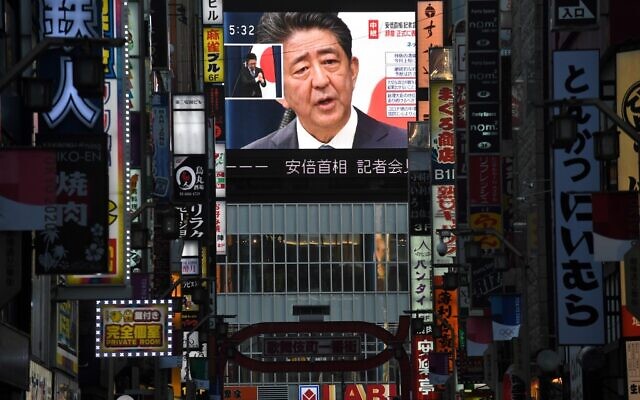TOKYO — Japan’s Prime Minister Shinzo Abe announced Friday he will resign over health problems, in a development that kicks off a leadership contest in the world’s third-largest economy.
“I have decided to step down from the post of the prime minister,” he told a press conference, saying he was suffering from a recurrence of the ulcerative colitis that ended his first term in office.
Abe said he was receiving a new treatment for the condition, which needed to be administered on a regular basis and would not leave him sufficient time to discharge his duties.
“Now that I am not able to fulfill the mandate from the people with confidence, I have decided that I should no longer occupy the position of the prime minister.”
In a country once known for its short-tenured prime ministers, the departure marks the end of an unusual era of stability that saw the Japanese leader strike up strong ties with US President Donald Trump even as Abe’s ultra-nationalism riled the Koreas and China.

US President Donald Trump walks with Japanese Prime Minister Shinzo Abe before playing a round of golf at Mobara Country Club, in Chiba, Japan, on May 26, 2019. (AP Photo/Evan Vucci)
While he pulled Japan out of recession, the economy has been battered anew by the coronavirus pandemic, and Abe has failed to achieve his cherished goal to formally rewrite the US-drafted pacifist constitution because of poor public support.
Abe is a political blue blood who was groomed to follow in the footsteps of his grandfather, former Prime Minister Nobusuke Kishi. His political rhetoric often focused on making Japan a “normal” and “beautiful” nation with a stronger military and bigger role in international affairs.
Hiroshige Seko, a party secretary general for the Upper House of the parliament, confirmed that Abe told party executives he is resigning as prime minister.
Seko said Abe said he decided to resign in order not to cause trouble.

Japanese Prime Minister Shinzo Abe is seen on a large screen during a live press conference in Tokyo on August 28, 2020 (Philip FONG / AFP)
Abe became Japan’s youngest prime minister in 2006, at age 52, but his overly nationalistic first stint abruptly ended in disappointment a year later because of his health.
In December 2012, Abe returned to power, prioritizing economic measures over his nationalist agenda. He won six national elections and built a rock-solid grip on power, bolstering Japan’s defense role and capability and its security alliance with the US. He also stepped up patriotic education at schools and raised Japan’s international profile.
Abe on Monday became Japan’s longest serving prime minister by consecutive days in office, eclipsing the record of Eisaku Sato, his great-uncle, who served 2,798 days from 1964 to 1972.
But his second hospital visit Monday has accelerated speculation and political maneuvering toward a post-Abe regime.

FILE – In this Aug. 6, 2020, file photo, Japanese Prime Minister Shinzo Abe walks off after delivering a speech during a ceremony to mark the 75th anniversary of the bombing at the Hiroshima Peace Memorial Park, in Hiroshima, western Japan (AP Photo/Eugene Hoshiko, File)
Ulcerative colitis causes inflammation and sometimes polyps in the bowels. People with the condition can have a normal life expectancy but serious cases can involve life-threatening complications.
After his recent hospital visits were reported, top officials from Abe’s Cabinet and the ruling party said Abe was overworked and badly needed rest.
His health concerns added to speculation that Abe’s days in office were numbered; his support ratings were already at their lowest levels due to his handling of the coronavirus pandemic and its severe impact on the economy, on top of a stream of political scandals.
There are a slew of politicians eager to replace Abe.

Japan’s Chief Cabinet Secretary Yoshihide Suga arrives at the prime minister’s office in Tokyo on August 28, 2020 (Kazuhiro NOGI / AFP)
Shigeru Ishiba, a 63-year-old hawkish former defense minister and Abe’s archrival, is a favorite next leader in media surveys, though he is less popular within the ruling party. A low-key former foreign minister, Fumio Kishida, Defense Minister Taro Kono, Chief Cabinet Secretary Yoshihide Suga, and economic revitalization minister Yasutoshi Nishimura, who is in charge of coronavirus measures, are widely speculated in Japanese media as potential successors.
Abe, who repeatedly faced public criticism for his handling of the coronavirus outbreak, was often upstaged by Tokyo Gov. Yuriko Koike, a former ruling party conservative who’s seen as a potential prime minister candidate by some. But she would have to first be elected to parliament to be in the running for the top job.
The end of Abe’s scandal-laden first stint as prime minister was the beginning of six years of annual leadership change, remembered as an era of “revolving door” politics that lacked stability and long-term policies.
When he returned to office in 2012, Abe vowed to revitalize the nation and get its economy out of its deflationary doldrums with his “Abenomics” formula, which combines fiscal stimulus, monetary easing and structural reforms.
Abe’s unpopular coronavirus measures sent his support ratings plummeting before his health issues.
Perhaps Abe’s biggest failure was his inability to fulfill a long-cherished goal of his grandfather to formally rewrite the US-drafted pacifist constitution. Abe and his ultra-conservative supporters see the US-drafted constitution as a humiliating legacy of Japan’s WWII defeat.
He was also unable to achieve his goal of settling several unfinished wartime legacies, including normalizing ties with North Korea, settling island disputes with neighbors and signing a peace treaty with Russia.
 RSS Feed
RSS Feed















 August 28th, 2020
August 28th, 2020  Awake Goy
Awake Goy  Posted in
Posted in  Tags:
Tags: 













